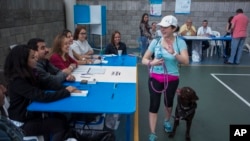Voters in Guatemala went to the polls on Sunday to choose the central American country's next president, who will be under immense pressure from the United States to implement a controversial migration pact.
Both candidates -- former first lady Sandra Torres and conservative Alejandro Giammattei -- have avoided committing to strong positions over the pact, which would permit the United States to send most Honduran and Salvadoran asylum seekers who passed through Guatemala back to the poor, crime-stricken country.
As they cast their ballots, Torres and Giammattei urged voters to turn out and reiterated their pledges to fight unemployment, improve health care and education, and rid the country of corruption and violence.
The winner of the runoff vote will take office in January to replace the corruption-tainted Jimmy Morales, who leaves with his popularity at rock bottom.
"All we want is for the next president to end crime so that you can go out in public without fear," elevator technician Edgar Chiquito told AFP in the western indigenous town of Sumpango.
"All I hope" is that the new president "doesn't forget the people," the 43-year-old added.
Electoral court president Julio Solorzano urged citizens to avoid violence if the vote doesn't go their way, saying that preliminary results would be published in real time on the court's official website to provide transparency.
Corruption was the main issue leading up to the first round of elections in June -- which Torres topped -- but that has been superseded by the political scandal over the migration deal with the United States.
Neither candidate arrives with a glowing reputation.
The center-left Torres, whose ex-husband Alvaro Colom was president from 2008-12, has been suspected of involvement in corruption before.
Influential businessman Dionisio Gutierrez recently described her as "a questionable politician with a history that should worry any citizen."
Giammattei, a conservative and opinion poll frontrunner, has hardly come off any better. Investigative website Nomada branded him as "impulsive... despotic, tyrannical... capricious, vindictive," among other undesirable traits.
But the 63-year-old, a doctor by profession, scores well on voter concerns such as the economy, corruption and security, according to Risa Grais-Targow of the Eurasia Group.
Should he win, though, he "would face a lose-lose scenario" regarding the migration pact, Grais-Targow said.
One of Morales's last acts as president was to authorize an agreement with the US administration of Donald Trump designating Guatemala as a "safe third country," which would permit Washington to turn away asylum seekers who have passed through Guatemala without seeking refuge there.
The pact -- part of Trump's campaign to stem the flow of migrants to the southern US border -- has proved highly unpopular in Guatemala, with demonstrators blocking roads and occupying the University of San Carlos.
In a poll by Prodatos for the Prensa Libre newspaper, 82 percent of respondents opposed it.
But rejecting the migration pact would run the "risk of retaliation from Trump," Grais-Targow said, after the US leader threatened a travel ban, tariffs and remittance fees if the country didn't bend to his will.
Remittances from Guatemalans in the US are a crucial part of the economy, reaching a record $9.3 billion last year. That compares to Guatemala's export revenue of $10.5 billion.
According to the World Bank, remittances account for 12 percent of the country's GDP.
The agreement was reached last month despite Guatemala's constitutional court having granted an injunction blocking Morales from signing the deal.
Almost 60 percent of Guatemala's 17.7 million citizens live in poverty in a country with one of the highest murder rates in the world.
Around half the killings are blamed on drug trafficking and extortion operations carried out by powerful gangs.
Morales, barred by Guatemalan law from seeking a second term, turned up to vote wearing his favorite football team's jersey.
He urged his replacement to reduce undocumented migration, improve education and tackle chronic malnutrition in the under-fives, which affects 46 percent of infants.
He has his own problems as the attorney general's office is looking to investigate him for corruption.
